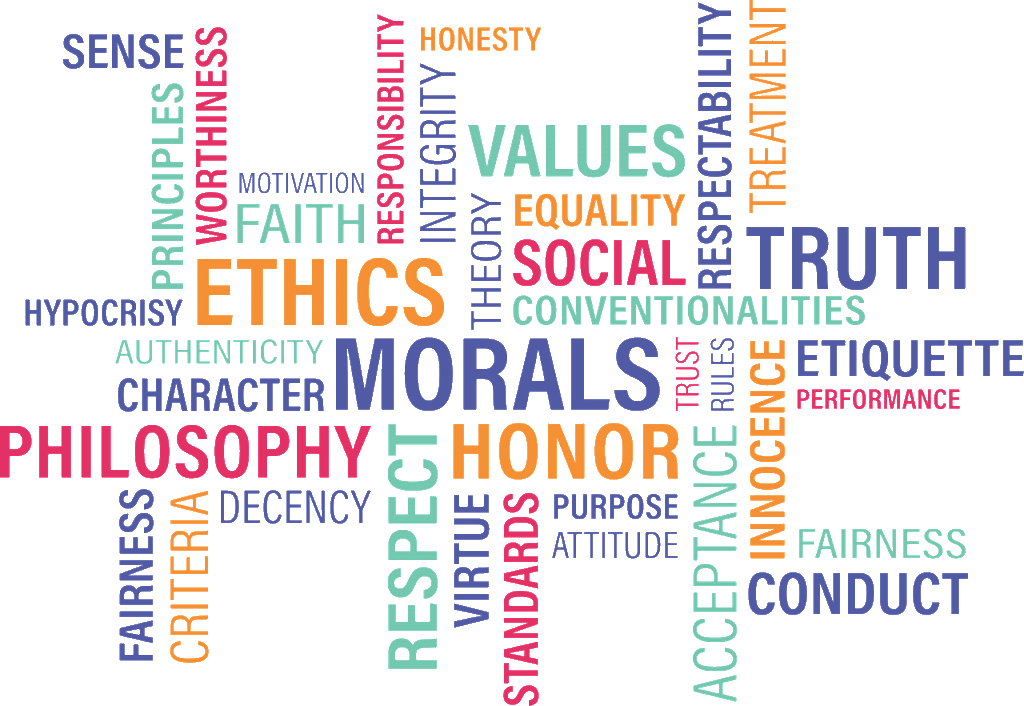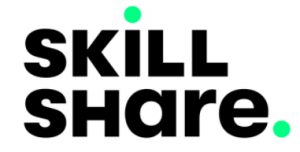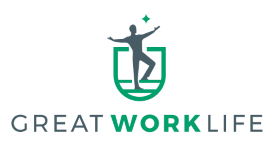There are many reasons to drive ethical leadership into your team and across your organization, from personal character building to high-performing, respectful, and motivated team members. Start using our 6-point F-A-T-H-E-R framework today and watch your career go from strength to strength.
This article will enable you to understand the complicated world of ethics easily and apply these principles to make you a better, more respected leader. We even include a proven workshop format to enable your team to understand the values and principles of ethics, which will motivate and empower them.

What is Ethical Leadership?
Ethical leadership is the art of leading people and making good decisions based on a defined set of values, such as fairness, accountability, trust, honesty, equality, and respect. These values form the core foundation of ethical leadership.
Ethics is a way of distinguishing right from wrong using a set of values or moral principles. Establishing values for yourself and your company can help you practice ethical leadership.
Ethical Leadership Principles: FATHER Framework™
Six Key Values Form the Principles for Ethical Leadership.
The F-A-T-H-E-R Framework. Fairness, Accountability, Trust, Honesty, Equality & Respect.
Fairness
The principle of fairness is at the core of how humans interact and expect to be treated. By default, we expect to be treated fairly and strive to treat others fairly. As a leader, you should treat your team, tribe, or followers fairly. Showing favoritism or treating people differently in the same situation can breed contempt among your people. Fairness is also related to disciplining people if they have behaved inappropriately. You need to avoid unequal discipline for the same issue across multiple employees.
Accountability
Being accountable for bad decisions or mistakes shows your moral fiber. We all make mistakes, but many of us will not admit them and move on. It is human nature to blame others, situations, or even the gods. But accepting accountability shows you are a strong, well-rounded leader with a character that people will respect and follow.
Trust
Great relationships and great teams are built on trust. If you cannot completely trust your partner, your relationship will eventually fail. If you cannot trust your team’s integrity, your team will ultimately fail and tear itself apart. Your team, family, and friendships rely on trust to grow and develop meaning. All high-performing teams, whether in the military, football teams, or teams within your company, will have a strong foundation of trust.
Honesty
Being able to discuss important issues openly and honestly with those around you is key to the integrity of our relationships. Honesty directly feeds into trust. If you cannot be honest with someone, you cannot trust them to hear the truth, or at least your version of the truth.
Equality
The principle of equality is core to our global human survival and happiness. There are so many inequities in the world, based largely on the fact that people love to discriminate against others for so many reasons. Be it color, faith, gender, sexuality, height, weight, or even hair color, if you practice discrimination and inequality, you are not a well-rounded person, either intellectually or morally.
I remember my first encounter with the word equality. As a child growing up in a poor area in central England in the 1970s, my first school was very mixed-race. I heard other children calling Indians, Pakistanis, and Jamaicans racist names. To me, it was bizarre. I am a person; they are people; why do others mistreat people because of the color of their skin? All types of discrimination are disgusting, and if you practice it, you will only breed contempt among the people around you, and you will never achieve any true enlightenment.
Respect
Respect has many meanings, but the core meaning of respect is to show regard for the wishes, feelings, and rights of others. You may not agree with other people’s feelings or wishes, but you need to respect that they have those feelings. You must appreciate that someone is the way they are for a reason. A true understanding of humanity means you will learn to respect our differences. You may not agree with those differences, but you need the ability to consider why those differences exist.
With respect comes admiration. There is something to admire in everyone; it may just take time to find it. As you build upon your code of ethics or morals, you will find that as you demonstrate your character, more people will come to respect and even admire how you conduct your business, your choices, and your life.
It’s not about doing the right things, it’s about doing the right things the right way.
Now, you have the FATHER method for easily remembering the rock upon which your values should be built. Let’s examine your company’s values.

"When You Stop Learning, You Stop Living" SkillShare Makes Learning Easy. Skillshare Is Our #1 Rated Learning Platform With Great Lessons On:★★★★★ Creating: Photography, Film-Making, Music, Graphic Design & Coding ★★★★★ Building: Leadership, Communication, Entrepreneurship & Marketing ★★★★★ Thriving: Personal & Professional Development, Productivity, Time Management "Skillshare is like Netflix for learning. I take a course every time I need a new skill. With over 30,000 courses to choose from, I always have something to learn." Barry D. Moore - Founder: GreatWorkLife.com |
Understand Your Company’s Values & Code of Conduct
Most large companies have a process and set of stated values, usually called the Standards of Business Conduct (SBC). Many of the highest-caliber companies will also ask their employees to take a training course and test to prove they understand the code of ethics and the process by which to uphold and even escalate any breaches of conduct. There is much to be admired about operating these processes and having these standards in place. But in the real world, what is on paper and how people behave are usually different.
I worked as a manager and leader for Hewlett-Packard for many years, and they had a very solid standard of business conduct. However, in 2006, the board chair, Patricia Dunn, breached this moral code by initiating unlawful practices by spying on other board members to determine information leaks, also known as the HP Spying Scandal.
If an organization’s leaders flagrantly disrespect the codes of conduct, how do you think the staff will interpret it and behave?
In fact, Mark Hurd, the company’s CEO, was famous for radical redundancies and cost-cutting, including asking all the staff to take a 5% pay cut. He also resigned in 2010 after an investigation found that he was cheating on his expense claims.
In fact every year there are on average 4 corporate scandals that lead to complete insolvency of the company.
The Economist reported that:
“Boeing faces claims that it sold 737 max planes with dangerous software. It says it is “taking actions to fully ensure the safety of the 737 max”. Criminal charges have been filed against Goldman Sachs in Malaysia for its role in arranging $6.5bn of debt for a state-run fund that engaged in fraud. Goldman says it is cooperating with investigators. A jury in California has just found that Monsanto failed to warn a customer that its weed killer could, allegedly, cause cancer. Bayer, a German firm which bought Monsanto in June, says it will appeal the verdict.”
Even corporate leaders do not abide by their codes of conduct, so why should you?
Because you are better than that, you stand for something and have integrity; real integrity gets you a long way.
As you can see, plenty of examples of leadership without moral guidance exist. Research from the Institute of Leadership & Management noted:
- 63% of managers have been asked to do something contrary to their ethical code.
- 43% have been told to behave in direct violation of their organization’s values statements.
- 9% have been asked to break the law.
We need more ethical leadership, and it starts with you.
How to Make Good Ethical Leadership Decisions?
To keep it simple, two major theories/considerations in ethics are said to compete: duty and utilitarianism.
The duty-based approach establishes right or wrong based on a list of rules, such as the biblical rule “thou shalt not kill.” If you break the rule, you are in breach. Most company codes of conduct are duty-based.
The utilitarian approach judges a decision as right or wrong based on the consequences of “the greatest good or the least pain.”
In practice, you can explore the depths of the ethics branch of philosophy and engage in a complicated debate, or you can simply use both duty and utilitarianism to find the best solution for any given situation.

Types of Ethical Leadership
The Utilitarian “Greater Good” vs. Duty Approach to Solving the Auto Industry Crisis in 2008
The 2007-2010 financial crisis had a huge impact on the auto industry worldwide. Fear, panic, and mass redundancies had a huge impact on auto sales. This impact gave the two leading car manufacturing countries, the USA and Germany, a very difficult dilemma. They would go bankrupt if they did not slash costs and ramp down production.
The American Approach – Duty-Based Approach
Because US workers have minimal employment rights, it was easy for the giants of the US auto industry to slash and burn huge swathes of its workforce and ramp down production quickly. Even so, General Motors & Chrysler needed a government bailout to survive. The impact of the recession and the labor-force reductions led to ghost towns, huge unemployment levels, poverty, and destitution.
This was a decision based on duty, a duty to the shareholder to keep the company going at the expense of everything else.
The German Approach – Utilitarian-Based Approach
The German labor market is somewhat more protected, requiring employers to pay a severance package based on the social situation of the employee, meaning, depending on how many years you are with the company and how many children you have, you will get a significant payment to help you readjust to new employment. This was probably a factor in the decision-making process for the German Auto industry leaders, and it led to an entirely different outcome during the auto industry crisis.
Instead of mass redundancies in the auto industry, the German car assemblers asked people to move to part-time employment during the recession voluntarily. This still achieved the goals of slashing labor costs but did not create the pain of social implosion caused by mass unemployment and the social disintegration of collapsing communities, as witnessed in the USA’s ghost towns.
The workers absorbed a reduced income and made cutbacks, but it was for the greater good as they did not lose their homes and employment.
This can be classified as the utilitarian approach; the decision was effective for the greater good and the least pain and suffering. The USA experienced a jump in inequality and a decline in the fair distribution of wealth. The German experience was that of social cohesion in a time of difficulty. There was no poverty, no loss of jobs, no social impact—simply people coming together in a time of difficulty.
The outcome after the recession was that the German automakers could bounce back quickly as they still maintained their entire staff, meaning Volkswagen jumped to become the largest carmaker in the world.
Now that we understand core personal values and two ways of making good ethical decisions, we can move on to being great ethical leaders.
The Most Famous Ethical Leader
Great leaders build their foundations on a set of principles; we have discovered the F-A-T-H-E-R principles of fairness, accountability, trust, honesty, equality, and respect. But these principles are a core guideline, but not all-encompassing. We should delve into the details of one of the greatest moral leaders in history to see their similarities and differences to the FATHER principles.
Abraham Lincoln – The Role Model for Ethical Leadership
Abraham Lincoln’s existence on this planet was a true gift to humanity. His fight for equality and the will to bring people together for the greater good are as astounding today as they were unimaginable then.

Lincoln on Respect & Trust & Honesty
Lincoln had the capacity to listen to different points of view. He created a climate where Cabinet members were free to disagree without fear of retaliation. At the same time, he knew when to stop the discussion and, after listening to the various opinions, make a final decision.
Lincoln on Accountability
“The path to success and ambition is broad enough for two.”
“When mistakes were made by members of his Cabinet, Lincoln stood up for them said, Kearns Goodwin. When contracts related to the war effort raised serious questions about a member of his administration, Lincoln spoke up and indicated that he and his entire Cabinet were to blame.”
Lincoln on Equality
“In the summer of 1864, said Kearns Goodwin, the war was not going well for the North. Members of his political party came to Lincoln and said that there was no way to win the war, and he might need to compromise on slavery. Lincoln held firm on the issue of slavery and turned away from this advice.”
Lincoln on Respect & Integrity
“With malice toward none, with charity for all, let us strive on to finish the work we are in, to bind up the nation’s wounds, to care for him who shall have borne the battle and for his widow and his orphan, to do all which may achieve and cherish a just and lasting peace among ourselves and with all nations” Source.
Live Your Values – Being A Role Model
Now that you have established your moral values and uphold your company’s ethical standards, it is time to start building your base of integrity, respect, and ethical leadership. It all starts with your first team; whether you are a CEO, CIO, CFO, or manager, you can start your own movement.
There are huge benefits to implementing ethical leaders; one study at Cornell University found that “ethical leadership was positively and significantly related to employee performance.”
 Audiobooks Are Food for the Mind Inspiration, Education & Relaxation Have you discovered the joy of listening?★★★★★ Audible: Review Winner - Best for Price, Library Size & Original Content. ★★★★★ Blinkist: Review Winner - Best Audiobook Summary Service. ★★★★ Audiobooks.com: Best For Unlimited Audiobook Listening. "As a 10-year member of Audible, I have a library of 300+ audiobooks. The best thing is, with a few clicks, I can return any book within 12-months. I also subscribe to Blinkist; with 5,000 15-minute audio-summaries, I can consume knowledge and learn new concepts fast." Barry D. Moore - Founder: GreatWorkLife.com |
Building Your High-Performance Ethical Team
Whether you inherit an existing team or have the honor of building a new team, you will need to establish ground rules for the team’s interactions and behavior. So, it all starts with communication. I recommend a team workshop.
Workshopping the Teams Value Principles.
For an established team, it is worth holding a dedicated morning or afternoon workshop to cover the F-A-T-H-E-R principles.
Team Ethics Workshop Format
The FATHER framework has six core values, so start by splitting the team into six groups and assigning each team a single principle. Then, ask each group to spend 15 minutes preparing an interpretation of the principle and giving a practical example of how the value can be used in the workplace. Ask each team to present their findings and discuss each one as a group.
Establishing Team Values
After the workshop, you can wrap up by sharing your modus operandi for the team moving forward. The following list helps relate the values into meaningful behaviors. Please note that when you communicate, you should always use the term “We.”
We do not play politics.
Start by explaining to the team that playing politics with each other is not acceptable behavior. Politics usually involves bending the truth, impeding the progress of others, and generally not supporting each other.
We always treat each other with respect.
There should never be a reason for raised voices, aggressive behavior, rudeness, or foul language; professional respect must be paramount.
We do not talk behind other people’s backs.
Gossiping about other people’s personal lives, talking bad about others, and generally creating a negative atmosphere in the team will count heavily against anyone engaging in these activities.
We operate with openness and honesty.
We need to encourage and demand an environment of openness and honesty. When we are honest, we will always do it with respect.
We are here to support and trust each other.
When one of us is struggling, we must help and support them. My job as a manager and one of your roles as a trusted team member is to help the team succeed, which means the whole team.
We will manage opportunities, successes, and failures fairly.
When we have exciting opportunities, potential promotions, or business travel available, they are usually offered to the whole team. If you feel you are not getting your fair share of these opportunities, talk to me in our one-on-one sessions.
Individual success Is team success.
Our success as a team will propel all your careers and get us noticed. Team success means individual success; no one should be left behind. High performance means success for everyone.
[Related Article: Hiring Ethical People – Great Cultural Fit Interview Questions]
Creating Ethical Cultures In Business Video
Summary
There are many reasons to drive ethical leadership into your team and across your organization, from personal character building to having high-performing, respectful, and motivated team members. Start using our 6-point FATHER framework today and watch your career go from strength to strength.

I enjoyed this article very much and it’s certainly helping me with my studies on the subject of Ethics.
However, I find your presumption that Abraham Lincoln is ‘the’ role model of ethical leadership to narrow minded and simply from an American point of view rather than a Global one.
Stating one example from your acronym of FATHER simply isn’t enough to identify Lincoln as ‘the role model’ rather you should refer to him as ‘one of the role models’.
I am quite sure there were several times where he chose to be unethical and they went unpublished. As a politician it’s just not possible to be ethical all of the time only appear ethical at certain times, and with some of his more famous decisions he did appear ethical and much adored.
Thank you for this interesting, and i want to know who’s the pillar of FATHER framework please?
Interesting content*
I guess I must be, I created the father framework. 🙂
Hello there! I enjoyed this fantastic article. Thank you.
This is invaluable information, because it serves as a solid foundation for team building. Using the FATHER method seems to instill ethical soundness within the group. This has helped me tremendously.
thank you, I am happy it helps.
Barry